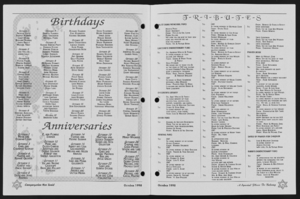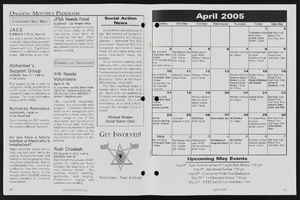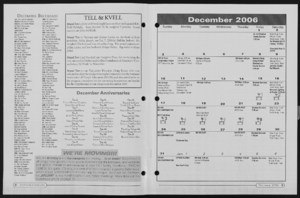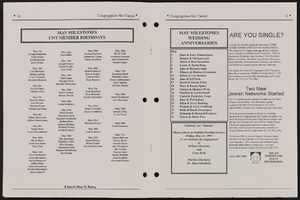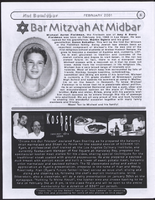Search the Special Collections and Archives Portal
Search Results

Larry Mason interview, September 14, 2018: transcript
Date
Archival Collection
Description
Interviewed by Nathalie Martinez. Larry Mason is an Arizona native that moved to Las Vegas as a Higher Education Administrator. He was born in Tuscon, Arizona, but grew up mostly in East Los Angeles and his "Gramitas" ranch in Sonora, Mexico. He has a history in athletics as a basketball player in his upbringing which brought him to play at the New Mexico Highlands University and the European League. Earning a Masters in Education, Larry Mason came to Las Vegas to become the first Latino Director of Admissions at UNLV, first Latino President of the Board of Education, and first Latino Vice President of the Board of Education in the Clark County School District. He launched an incredible amount of movements within the educational field in Las Vegas including (but not limited to): the Mariachi program, the magnet school program, and the growth of the Diversity Division within the NSHE. Some of his greatest supporters and allies included Senator Harry Reid, John Lujan and Tom Rodriguez. Mason continues to work as a community leader for minority representation in STEM fields, as a board member for the Nevada STEM Coalition.
Text
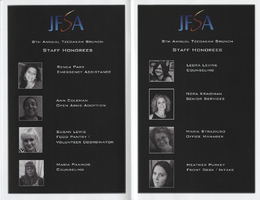
Pamphlet from the 8th annual Jewish Family Service Agency Tsedakah event, 2015
Date
Archival Collection
Description
This pamphlet contains statistics about Jewish Family Service Agency services provided to the community, and sponsorship advertisements from local businesses.
Text

Transcript of interview with Elizabeth "Betty" Krolak by Irene Rostine, September 26, 1995
Date
Archival Collection
Description
In 1962, Elizabeth “Betty” Krolak moved from the Midwest to Las Vegas with her husband and six children. Not only would the drier desert climate benefit her youngest daughter’s health due to asthma, but the family hoped the Las Vegas economy would be beneficial for their future. Prior to her arrival in Las Vegas, Betty worked briefly as a secretary for the New York Central Railroad before becoming a stay-at-home mom and active member of the PTA. Upon their arrival in Las Vegas, Betty’s husband enrolled in a real estate class, but was unable to complete the program. Betty, not wanting to waste the $80 they had spent on the class, decided to attend in his place. This decision led to life changing events for Betty and her family over the next four decades. After taking the real estate class and passing the test, Betty became a licensed Nevada real estate broker in October of 1963. She initially went to work for Pyramid Realty and, in 1964, she opened her own office, Clark County Realty. After her divorce in 1967, Betty was left with “six hungry children” to feed and no child support or health insurance. She recalls how the benefits of being in real estate really became apparent during this period of her life. While real estate required long hours seven days a week, it also afforded a single mother flexibility that other careers would not have offered. Likewise, a woman could make more money in real estate in the 1960s and 1970s than most other careers provided, which was particularly important for Betty who was committed to raising her children without public assistance. Betty’s oral history chronicles the growth of the Las Vegas Board of Realtors which has grown into what today is the Greater Las Vegas Association of Realtors (GLVAR). She recalls how, in the 1960s, meetings took place in bowling allies and the primary role of the GLVAR was to provide networking opportunities and represent the Code of Ethics for realtors. However, the Board was dominated by males, with the role of women members confined to planning social events and arranging for refreshments. In 1968, Betty and several other women realtors set out to change this by initially establishing a local Women’s Council within the Board. In the years following, Betty became the first women to be an Executive Board Member. Today, more than half the members of the Executive Board are women. Betty’s oral history also speaks to many changes within the real estate industry over the past four decades, some positive and some not so positive. She recounts the 1960s to the 1980s, when casino workers’ main source of income came from tips which were often unreported, creating challenges in getting casino workers qualified for home loans because they did not have the ability to document their source of income. Likewise, single women had a hard time qualifying for home loans because they only had one income and, in those days, it rarely was enough to qualify for a mortgage on their own. Also during this period, realtors primarily focused on the resale market because builders wanted to work directly with buyers, but changes in the real estate market eventually led builders to realize the benefits of allowing realtors to sell new houses, too. During her career, Betty also experienced the rise of real estate franchises, beginning with Century 21’s arrival in Nevada, the development of Multiple Listing Service (MLS), changes to educational requirements, approaches to settling disputes, and new approaches to ethics violations. Perhaps the biggest change Betty’s oral history speaks to is the personal approach to selling real estate that has been lost over time. In the early days, brokers sold houses right alongside the sales agents. Today, however, regulations have placed brokers in a position where their primary role is to manage sales people, not sell houses. Also, realtors used to interact with other realtors, title company personnel, and mortgage lenders before technology, such as fax machines and computers, came along. In the early days, documents were transferred in person allowing people in the industry to get to know one another through these personal interactions. Today, everything is done electronically and it is rare to actually know the person on the other end. Selling real estate has lost a lot of its personal touch, according to Betty. In addition to being the mother of six children and running one of the largest real estate offices in the area, Betty also found time to give back to the community through her volunteer work with the Salvation Army. She was instrumental in establishing Southern Nevada’s Angel Tree project, which provides Christmas presents to children who otherwise would not receive them. She was also appointed by Governor Michael O’Callahan to the State of Nevada’s Real Estate Commission, making her the first woman to serve on the Commission. Betty’s career in real estate allowed her to witness and implement many changes that still impact the industry today. When Betty began her career, Las Vegas’ population was just over 45 thousand. By the mid-1990s Green Valley, Spring Valley, North Las Vegas, Summerlin, and Sun City had been developed and the Valley’s population exceeded 1 million people. Betty Krolak’s career merged with the real estate boom as she helped find homes for those who wanted to make Las Vegas their home. She made sure the real estate industry’s growth included women, training mechanisms, and ethics which continue to benefit realtors, home buyers, and home sellers to this day.
Text

Junior Fonotisatele oral history interview: transcript
Date
Archival Collection
Description
Oral history interview with Junior Fonotisatele conducted by Cecilia Winchell and Stefani Evans on November 10, 2021 for Reflections: The Las Vegas Asian American and Pacific Islander Oral History Project. Junior discusses his Samoan background and the importance of strong family values. He talks about his early years in Utah and California before moving to Las Vegas where he attended and graduated from the University of Nevada, Las Vegas. Junior shares his employment history as a bodyguard for Floyd Mayweather, an entrepreneur of a clothing brand, and an investor into a range of ventures including security, solar energy, and mental health. He concludes with a discussion of Samoan cultural celebrations, his religion, and the significance of his tattoos.
Text

Krystal Ramirez oral history interview: transcript
Date
Archival Collection
Description
Oral history interview with Krystal Ramirez conducted by Monserrath Hernández and Barbara Tabach on October 30, 2019 for the Latinx Voices of Southern Nevada Oral History Project. Krystal talks about her personal history growing up in Texas and spending summers with her family in Mexico. She shares her thoughts about how Las Vegas has changed and how she has contributed to the city's art scene as a staff photographer for Vegas Seven (a local magazine), the New York Times, and the Marjorie Barrick Museum. Subjects discussed include: Texas; Chihuahua, Mexico; Latinx Identity; Vegas Seven; Beat Coffee House; Downtown Las Vegas.
Text

